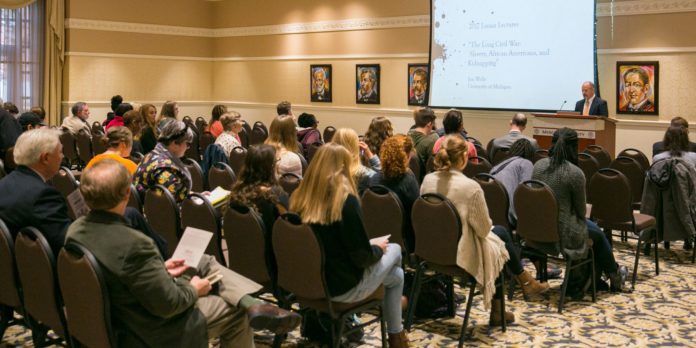MACON – Dr. Jon F. Sensbach, professor of history at the University of Florida, will deliver three lectures on the theme “Dream, Tremble, Fly: Slavery and Sacred Experience in the Revolutionary South” for Mercer University’s 62nd annual Lamar Lecture Series, the most prominent lecture series on Southern history and culture in the U.S.
The lectures, presented by Mercer’s Spencer B. King Jr. Center for Southern Studies, will take place Oct. 7-8 in the Presidents Dining Room, located inside the University Center on the Macon campus. They are free and open to the public.
Dr. Sensbach’s lectures explore how the private religious experience of black and white Southerners collided with slavery during the age of revolution. The examples of one Quaker, one Muslim and one Moravian show how the enchanted world of revelations, visions, emotions and memories both challenged slavery and helped the enslaved survive it.
His opening lecture, “Dream: ‘Christ Which was represented Black,’” will take place on Oct. 7 at 10 a.m., followed by “Tremble: Divine Sensation and the Middle Passage” Oct. 7 at 6 p.m. The series will conclude with “Fly: Transported Spirits” Oct. 8 at 6 p.m.
“We look forward to Professor Sensbach’s lectures as they are only the third series of Lamar Lectures given on religion and the first about the Atlantic World/colonial era,” said Dr. Doug Thompson, associate professor of history and director of the Spencer B. King Jr. Center for Southern Studies. “His research on the movement of religion across the Atlantic Ocean and the reformulation of those traditions will help expand our notions of Southern religion beyond the Bible Belt narrative. Sensbach’s use of biography to achieve that goal will be helpful for students and general audiences alike.”
Dr. Sensbach specializes in the history of early America, African Americans, the Atlantic world and religion.
He earned his Bachelor of Arts from the University of Virginia and Ph.D. in early American history from Duke University. He served as an assistant professor at the College of William and Mary and the University of Southern Mississippi before joining the faculty at the University of Florida in 1998.
In UF’s Department of History, Dr. Sensbach teaches a foundation graduate course on early America and has recently taught a graduate seminar on the Black Atlantic as well as undergraduate courses on the Atlantic slave trade, colonial America and the American Revolution.
He has been a National Endowment for the Humanities (NEH) Fellow at the National Humanities Center and an NEH Postdoctoral Fellow at the Omohundro Institute for Early American History and Culture.
His most recent book is Rebecca’s Revival: Creating Black Christianity in the Atlantic World (Harvard, 2005), and he is also the author of A Separate Canaan: The Making of an Afro-Moravian World in North Carolina, 1763-1840 (North Carolina 1998). He is currently working on a study of religious awakenings in the early South and Atlantic world.
The Lamar Lecture series, made possible through a bequest from the late Eugenia Dorothy Blount Lamar, began in 1957. The series promotes the permanent preservation of Southern culture, history and literature. Speakers have included nationally and internationally known scholars, such as Cleanth Brooks, James C. Cobb, Trudier Harris, Fred Hobson, Eugene Genovese and Eric Sundquist. The University of Georgia Press publishes the lectures each year.
About the Spencer B. King Jr. Center for Southern Studies
The Spencer B. King Jr. Center for Southern Studies fosters critical discussions about the many meanings of the South. As the only center for southern studies in the United States dedicated to the education and enrichment of undergraduate students, the Center’s primary purpose is to examine the region’s complex history and culture through courses, conversations and events that are open, honest and accessible. In addition to private gifts from donors, the Center is supported by a National Endowment for the Humanities Challenge Grant.









